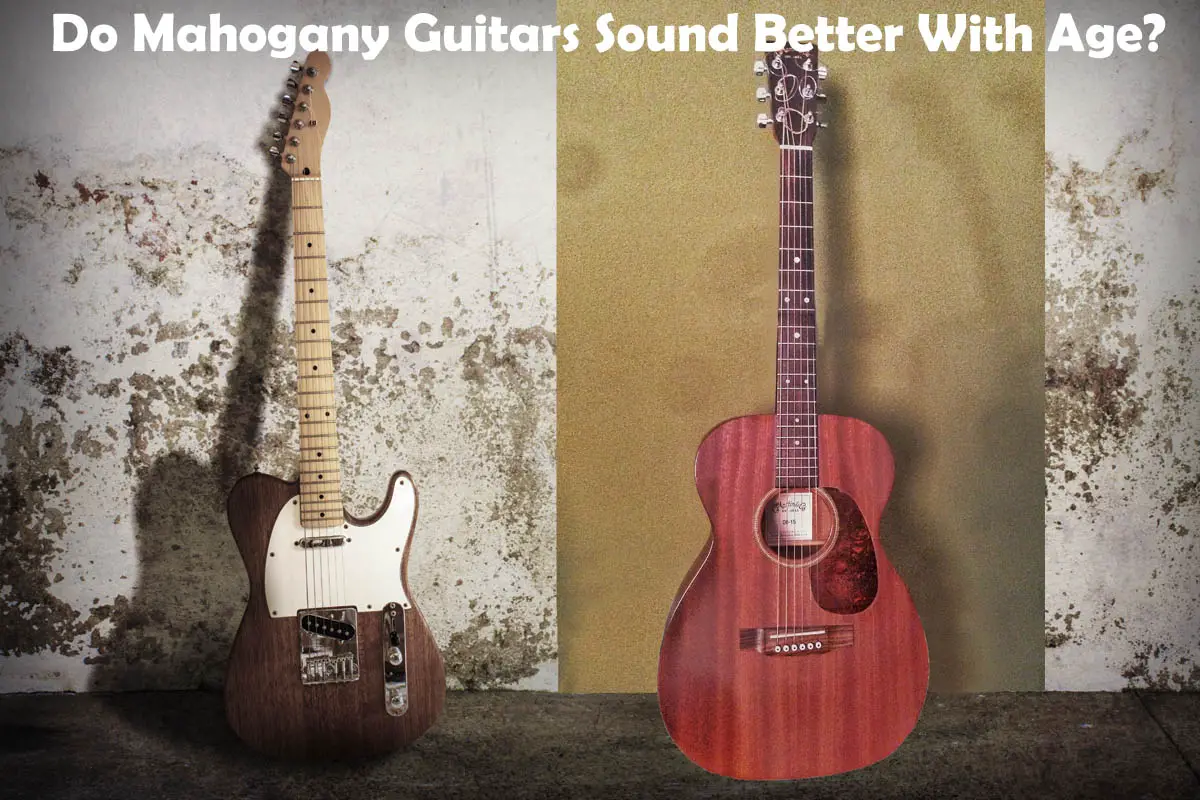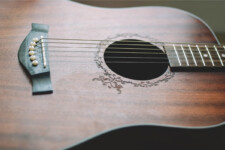Do Mahogany Guitars Sound Better With Age?
Mahogany is a common wood used for guitars, and it is known for its rich, warm sound.
The debate over whether mahogany guitars sound better with age is one that has been around for years.
Some guitarists believe that the wood matures and develops a richer, more complex tone over time. Others argue that the tone of a mahogany guitar stays relatively consistent throughout its lifetime.
Let’s take a look at how the sound changes on mahogany guitars over time, and if aged mahogany guitars are worth buying.

The Sound of Mahogany Guitars
Acoustic Guitars
Some guitarists prefer the sound of a mahogany-top acoustic guitar for its solid midrange tone that works so well for blues, while others find it lacking the complex overtones of spruce.
Mahogany has become more popular for custom acoustic guitars recently, producing a controlled warm resonant tone with good sustain.
Mostly though, mahogany is used for the back, sides, and neck of acoustic guitars, with a spruce top. This brightens up the sound, with the mahogany balancing out the spruce to create guitars with great tonal range.
Electric Guitars
On electric guitars Gibson is well known for using Mahogany for their solid body electrics, and works well with humbuckers to get that solid punchy midrange tone that works so well for rock.
Other manufacturers also use mahogany, however there are different types of mahogany, with the species grown in Central and South America being sought after for its sound properties.
Mahogany Guitars and Age
Mahogany guitars are often lauded for their rich, full sound. But what about the impact of age on these instruments? Does time make a difference in the tone of a mahogany guitar?
Many people believe that mahogany guitars sound even better with age. There are a few reasons why this might be the case.
First, the wood itself gets more mellow as it ages. Second, the finish on the guitar wears down over time, which can also affect the sound.
As the wood ages, it becomes more resonant and produces a fuller sound. Of course, this is subjective – some players prefer the brighter sound of a new guitar.
Others argue that the sound of a mahogany guitar is relatively static; once it’s been played for a while, it won’t change much.
Many factors such as the type of mahogany used, the way the guitar has been cared for, and even the climate it’s been kept in can all affect its sound.
The Difference Between New Mahogany Guitars and Old Ones
When it comes to mahogany guitars, there can be a big difference between a new one and an old one.
New mahogany guitars tend to have a brighter, flatter sound, while old ones may have a more mellow resonant sound. The wood mellows and opens up over time, allowing the instrument to reach its full potential.
However, not all players agree with this, and argue that the sound of a mahogany guitar is relatively static; once it’s been played for a while, it won’t change much.
Martin and Guild guitars were known for making quite a few solid top mahogany guitars, and owners of these say that the sound has improved with age.
They describe it as sounding looser, fuller, and more responsive after a few years of playing, saying that the harder they play them the more the sound improves.
You will also find they become louder and more resonant as they age, but this is dependent on them being played regularly. Mahogany guitars are unlikely to improve in sound much just sitting unplayed in a case.
Electric guitars may not change in sound so much as the amount of sustain, and this is why aged mahogany guitars are a popular choice.
How Mahogany Guitars Age
As anyone who’s played guitar for a while knows, each instrument has its own unique voice.
This is partly due to the wood that the instrument is made of – different woods have different acoustic properties.
Mahogany is a popular wood for guitars, particularly for acoustic and semi-acoustic instruments, because it has a very warm tone. But does this tone actually improve with age?
Mahogany does what any wood does as it ages, in that the pores tighten up and the sap crystalizes further to become very hard. When a guitar top is made from it the whole sheet of wood can resonate more freely. This increased vibration can result in a fuller, richer tone.
Of course, there are many factors that contribute to the tone of a guitar, not just the type of wood used. So you can’t just say that a guitar will improve in tone as it ages simply due to being made of mahogany.
That being said, chances are if you have a good quality guitar made from mahogany and you play it regularly, the sound will change a little over time, and can sound more pleasing.
The wood matures and changes over time, becoming more resonant and producing a richer sound.
The Benefits of a Mahogany Guitar
- Mahogany is a strong hardwood wood resistant to dents and damage, and makes a very strong guitar.
- A mahogany guitar will have a good powerful midrange tone that can be clearly heard through a mix, or playing live with other musicians.
- Compared to many other ‘tonewoods’ mahogany is more resistant to changes in humidity and temperature.
- Mahogany soundboards are more resistant to cracking than spruce.
- Less likely to warp even with heavier gauge strings.
The Drawbacks of a Mahogany Guitar
- Mahogany lacks the visual appeal of some other guitar-making woods.
- Acoustic guitars with a mahogany top take longer to play in and develop their unique sound than lighter woods like spruce.
- Mahogany doesn’t have the wide bright tonal characteristics of rosewood, another commonly used wood for the back and sides of acoustic guitars.
- Mahogany is one of the lighter hardwoods, but it still makes heavier guitars than other woods. Electric guitars made with mahogany are quite heavy to hold.
- Can be ‘woody’ sounding without great clarity.
Is an Aged Mahogany Guitar Worth It?
When it comes to deciding whether an aged mahogany guitar is worth the investment, it ultimately comes down to personal preference.
Some guitarists believe that the wood matures over time, giving the instrument a richer and fuller sound. Others find that the aging process can actually degrade the quality of the sound.
Ultimately, it is up to you to decide whether an aged mahogany guitar is right for you, and the only way to know is to pick up a few and play them.
As an aged quality mahogany guitar gets older, not only is it a beautiful wood that looks great, but it also has a unique sound that can’t be replicated.
While it may be expensive to purchase an aged mahogany guitar, it’s definitely worth the investment if you love the sound of the instrument.
Ultimately, only time will tell whether a new mahogany guitar will truly improve with age.
Attribution
Acoustic Martin guitar in main image credit: pensierarte, CC BY 4.0 https://creativecommons.org/licenses/by/4.0, via Wikimedia Commons



